当前城市:淄博[切换]
- 手机雅思无忧

扫码登录
雅思考试主要是通过对考生听、说、读、写四个方面英语能力的考核,综合测评考生的英语沟通运用能力,实现“沟通为本”的考试理念。对于雅思考生来说,也有很多考试难点和政策盲区需要帮助解答。今天雅思无忧网小编准备了雅思懒人指南:写作、口语一起练 新航道John:口语要回答多长(上),希望通过文章来解决雅思考生这方面的疑难问题,敬请关注。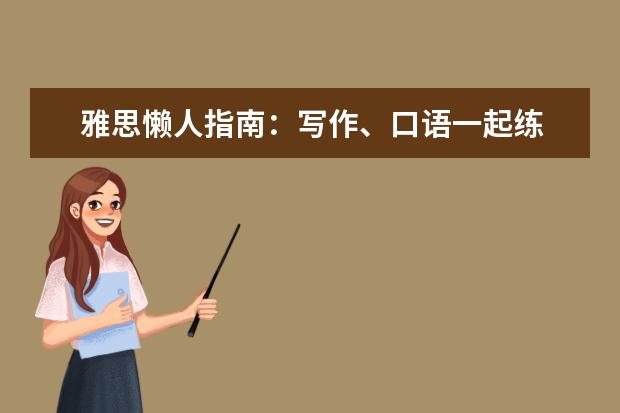
雅思写作和口语联系得比较紧密。究其原因,这两项考察的都是考生的输出功力。所以考生练习雅思写作的同时也能促进口语的能力。笔者将提出写作过程中常常出现的问题,以及如何通过练习写作增强口语能力的方法。
问题1:无话可说
这种情况就是考生见到题目时,脑袋中一片空白。既想不出文章结构,也想不出相应话题的词汇。雅思作文题材广泛,包括科技、教育、健康、环保、犯罪、文化传统、时尚、体育运动、动物保护等。这些都是考生在平时日常生活中极少接触到的话题,因此很难有想法。
懒人指南
多看剑桥雅思范文,看范文是如何提出论点,分析论点的。还要多关注时事,观察生活。争取见到一个值得讨论的问题,就能产生相应的论点和论据。很多作文题材也会出现在口语考试中,熟悉论点,论据,在雅思口语考试中也能用得到。
问题2:有话说不出
有的考生见多识广,看到话题时会想到很多想法。但是因为词汇量和逻辑方面有所欠缺。所以往往面临“满腹的心里话不知怎么说”的尴尬。往往口语考试中也会遇到这种情况。
懒人指南
经常可以看一下New Scientist,The Economist,National Geographic等杂志及其相应网站。主要看英语思维的人是如何谋篇布局,如何遣词造句。除了阅读之外,还可以背诵相应话题的相关词汇。这些词汇在口语考试中也能经常用到。多积累相应话题的论点和论据。最终要达到看到一个话题,15秒内做出文章结构,并浮现出相应论点,以及词汇。炼成后,口语考试也能言之有物。
问题3:想说就说
这类考生通常词汇量很大,思维也比较发散。写作文想到哪儿写到哪儿。口语考试也是想到什么说什么,往往给人摸不清思路的感觉。
懒人指南
建立自己的逻辑框架,并严格执行。如在写argumentation类题型时,全文四段:“第一段为背景介绍和提出论点段;第二段为己方观点论证段;第三段为让步段;第四段总结段。切忌任何与主题无关或相悖的鸡肋出现。 和写作相同,口语也要建立逻辑框架。先说论点,再补充细节。
附雅思写作十类题目
1. 教育类
2. 体育活动类
3. 语言类
4. 新闻广告类
5. 青少年类
6. 老年人类
7. 科技与传统类
8. 经济类
9. 国家*类
10. 变化类
本文为无忧雅思网和 学校联合征稿作品,转载请注明作者和出处!
IELTS Speaking Test: How long should my answers be?
I'm often asked by my students how long their answers to the interviewer's questions in the IELTS Speaking Test should be. In this article, I'll give some advice on how long your answers should be, and then give some simple advice on how to extend your answers.
Part One
In part one of the interview, which lasts four to five minutes, the interviewer will ask you some basic questions about topics that are familiar to you, such as your family, hobbies, or eating habits. Usually, the interview will ask you questions about three topics, and ask three to five questions per topic, for a total of nine to fifteen questions. Assuming that you spend the entire four to five minutes answering questions, you have about 20 to 30 seconds per question. Remember, though, that we must take into account the time it takes the interviewer to ask the questions.
Your answers in part one do not have to be all of the same length. For some questions, if you don't have much to say, it's fine to reply with just one to two sentences. For others, if you have a lot to say, you may want to answer with five or six sentences. The most important thing is to communicate a clear, full answer to the interviewer with some elaboration. As long as you do this, the interviewer will be satisfied with your answer, regardless of its length.
Part Two
In part two or the interview, the interviewer gives you a card and asks you to talk about the topic on the card for one to two minutes. You have one minute to prepare, and the interviewer will give you a sheet of paper and a pencil to take notes if you wish.
As long as you speak for somewhere between one and two minutes, the length of your answer is irrelevant, and your answer is judged on the level of language you present. If you speak for less than one minute, your score will be penalized; if you speak for more than two minutes, the interviewer will stop you, but your score should not be affected.
A misconception among many students is that you have to give very eloquent answers to get a high score on the IELTS Speaking Test. This is not the case. All that is necessary is that you give a clear answer using proper English. In part two of the interview, you are not expected to give a "professional" speech--after all, you only have only one minute to prepare! So relax, take a deep breath, and just talk about the topic that you are given in a clear, thoughtful manner.
(John Gordon 北京 学校副校长,雅思口语首席主讲)
以上就是雅思无忧网为您准备的访问雅思无忧网(https://www.yasi.cn/),了解更多雅思考试新消息,新动态。
雅思培训 新航道John:口语要回答多长(上) 提高口语水平、能要求考官换题吗
新航道John:口语要回答多长(上) 提高口语水平、能要求考官换题吗
雅思考试主要是通过对考生听、说、读、写四个方面英语能力的考核,综合测评考生的英语沟通运用能力,实现“
2023年04月22日 04:30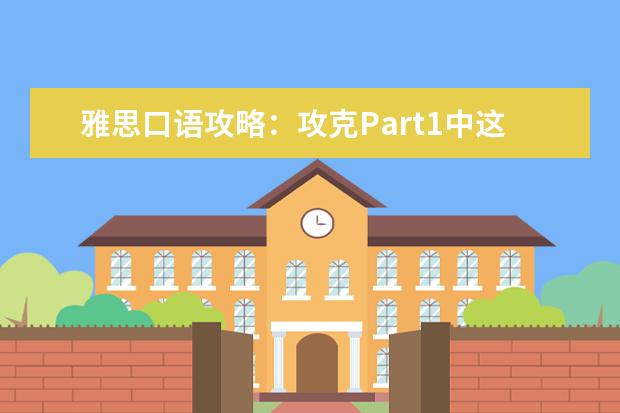 雅思口语攻略:攻克Part1中这最难的10道题 新航道John:口语要回答多长(上)
雅思口语攻略:攻克Part1中这最难的10道题 新航道John:口语要回答多长(上)
雅思考试主要是通过对考生听、说、读、写四个方面英语能力的考核,综合测评考生的英语沟通运用能力,实现“
2023年04月22日 21:09 新航道John:口语要回答多长(上) 写作与口语7分实用方法
新航道John:口语要回答多长(上) 写作与口语7分实用方法
雅思考试主要是通过对考生听、说、读、写四个方面英语能力的考核,综合测评考生的英语沟通运用能力,实现“
2023年04月22日 22:51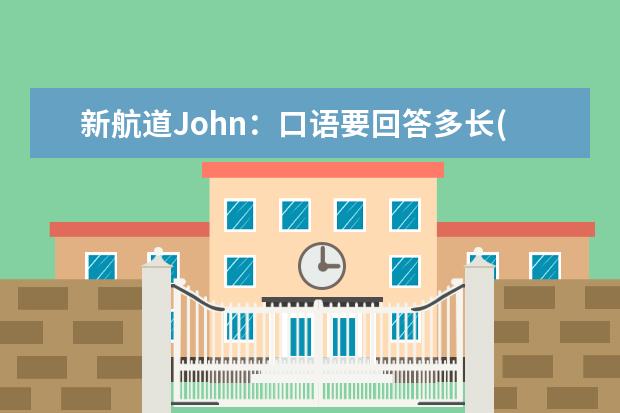 新航道John:口语要回答多长(下) 雅思口语考试说话停顿会不会影响得分
新航道John:口语要回答多长(下) 雅思口语考试说话停顿会不会影响得分
雅思考试主要是通过对考生听、说、读、写四个方面英语能力的考核,综合测评考生的英语沟通运用能力,实现“
2023年04月23日 01:15 关于口语机经的对话 新航道John:口语要回答多长(下)
关于口语机经的对话 新航道John:口语要回答多长(下)
雅思考试主要是通过对考生听、说、读、写四个方面英语能力的考核,综合测评考生的英语沟通运用能力,实现“
2023年04月23日 07:30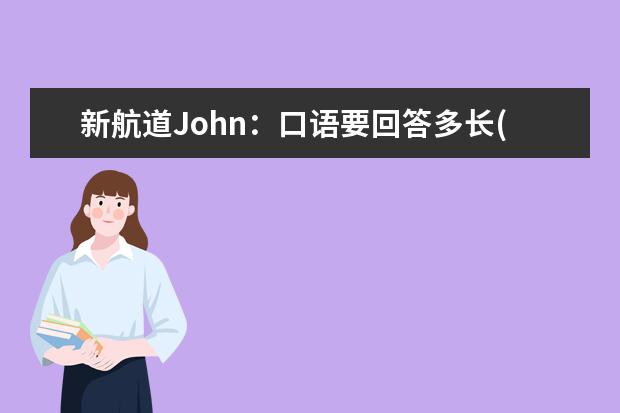 新航道John:口语要回答多长(下) 写作与口语7分实用方法
新航道John:口语要回答多长(下) 写作与口语7分实用方法
雅思考试主要是通过对考生听、说、读、写四个方面英语能力的考核,综合测评考生的英语沟通运用能力,实现“
2023年04月23日 16:33 在口语考试可以使用俚语吗 新航道John:口语要回答多长(下)
在口语考试可以使用俚语吗 新航道John:口语要回答多长(下)
雅思考试主要是通过对考生听、说、读、写四个方面英语能力的考核,综合测评考生的英语沟通运用能力,实现“
2023年04月23日 19:42 雅思口语练习:圣诞节的7个习俗 新航道John:口语要回答多长(上)
雅思口语练习:圣诞节的7个习俗 新航道John:口语要回答多长(上)
雅思考试主要是通过对考生听、说、读、写四个方面英语能力的考核,综合测评考生的英语沟通运用能力,实现“
2023年04月24日 14:15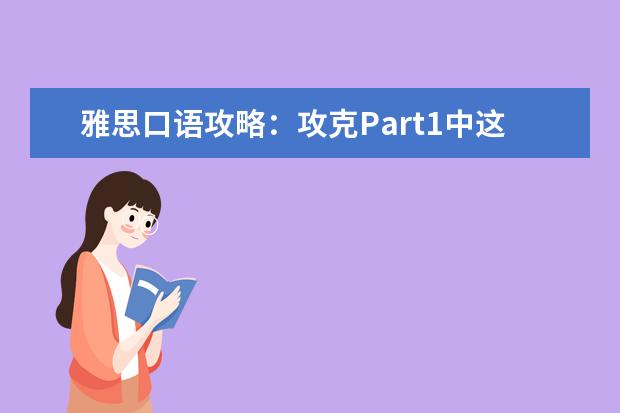 雅思口语攻略:攻克Part1中这最难的10道题 新航道John:口语要回答多长(下)
雅思口语攻略:攻克Part1中这最难的10道题 新航道John:口语要回答多长(下)
雅思考试主要是通过对考生听、说、读、写四个方面英语能力的考核,综合测评考生的英语沟通运用能力,实现“
2023年04月25日 15:03 雅思懒人指南:写作、口语一起练 新航道John:口语要回答多长(下)
雅思懒人指南:写作、口语一起练 新航道John:口语要回答多长(下)
雅思考试主要是通过对考生听、说、读、写四个方面英语能力的考核,综合测评考生的英语沟通运用能力,实现“
2023年04月26日 03:03